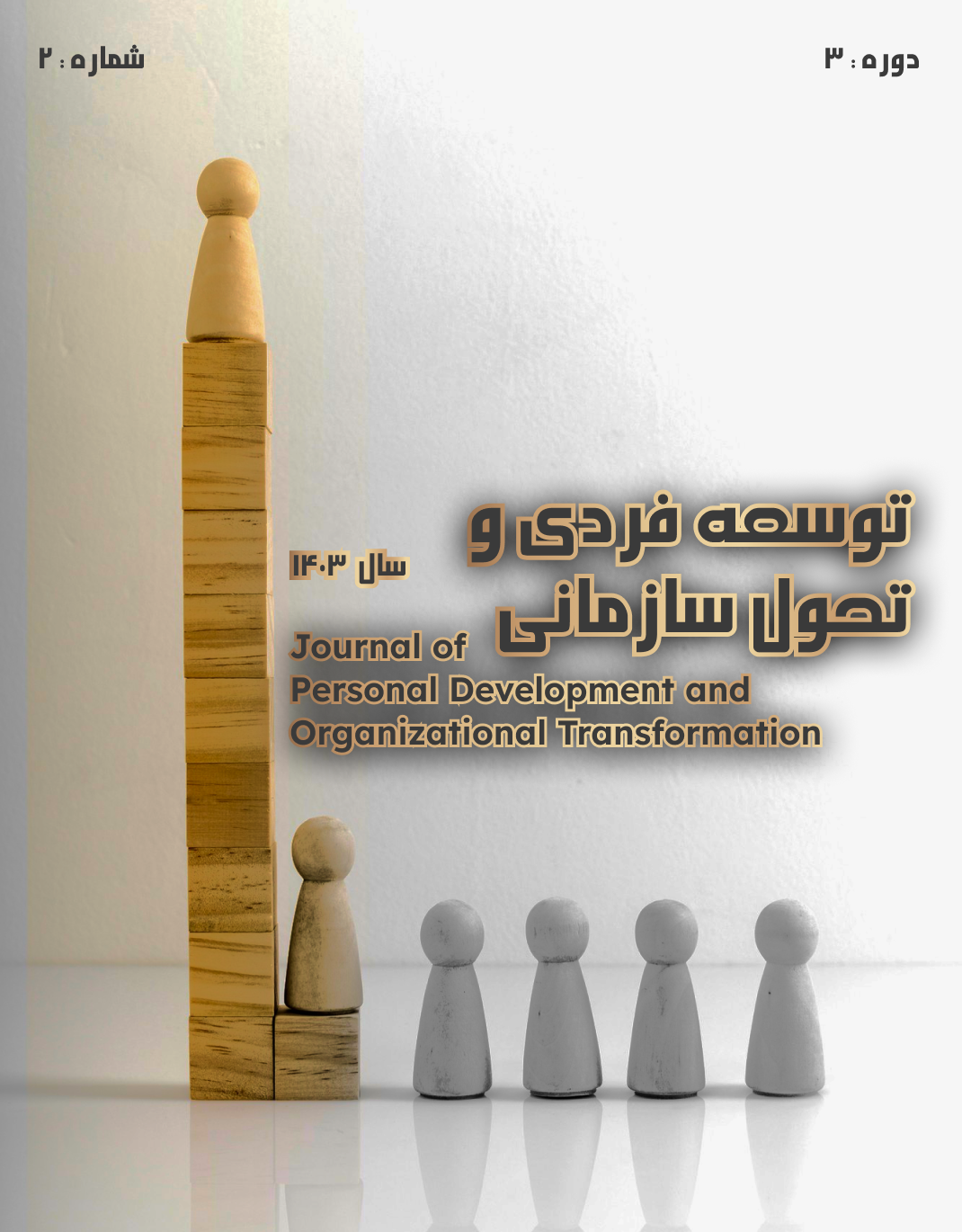کشف فرآیند شکلگیری فساد در سازمانهای دولتی عراق
کلمات کلیدی:
فرآیند شکل گیری فساد, خانواده فرآیند گلیزر, مراحل شکل گیری فساد, سازمانهای دولتی عراقچکیده
هدف از پژوهش حاضر، کشف فرآیند شکلگیری و توسعه انواع فساد سیاسی، اجتماعی، اقتصادی، اداری و بینالمللی در سازمانهای دولتی عراق است. این مطالعه از نوع پژوهشهای بنیادی با رویکرد تفسیرگرایانه و راهبرد کیفی دادهبنیاد بر پایه رویکرد گلیزر است. جامعه آماری شامل مدیران و خبرگان سازمانهای دولتی عراق بود که با آنها مصاحبههای نیمهساختاریافته صورت گرفت. نمونهگیری بهصورت نظری انجام شد و تا رسیدن به اشباع نظری، با ۲۱ نفر مصاحبه شد. اعتبار نتایج با چهار معیار گوبا و لینکلن بررسی شد. تحلیل دادهها با استفاده از دو مرحله کدگذاری حقیقی و نظری انجام شد. نتایج تحلیل دادهها نشان داد فرآیند شکلگیری فساد از طریق شش مرحله متوالی انجام میشود: انباشت شرایط تسهیلگر، تحریک نظام انگیزشی فساد، تکوین کنشهای انحرافی، طراحی و نهادینهسازی مسیر فساد، تثبیت ساختاری و بازتولید فساد، و نرمالسازی و بیحسی اخلاقی. در نهایت، این فرایند منجر به بروز پنج نوع فساد شامل فساد سیاسی، اجتماعی، اقتصادی، اداری و بینالمللی میشود. مدل استخراجشده میتواند بهعنوان الگویی مفهومی برای درک بهتر سازوکارهای شکلگیری فساد در سازمانهای دولتی عراق بهکار گرفته شود و از طریق شناسایی بهموقع مراحل آن، بستر طراحی راهکارهای پیشگیرانه و اصلاحی را فراهم آورد.
دانلودها
مراجع
Al-Ali, Z. (2014). The Politics of Corruption in Iraq. Middle East Journal.
Al-Ali, Z. (2019). The Politics of Corruption in Iraq Post-ISIS. Middle East Journal.
Al-Moulawi, A., Al-Rikabi, H., & Al-Khafaji, H. (2018). Towards a National Strategy to Combat Corruption in Iraq. Center for Studies and Planning Bayan Publications.
Darwish, S. (2023). Iraq's Administrative and Financial Corruption: A Perspective. Open Journal of Business and Management, 11(6DO - 10.4236/ojbm.2023.116151). https://www.scirp.org/journal/paperinformation?paperid=128669
Fazouni, M., & Zare, S. (2022). Approaches to Preventing Administrative Corruption: An Essential Necessity for Establishing a Healthy and Transparent Government. Quarterly Journal of Accounting and Management Perspective, 3(33).
Ghorbani, A. (2021). The Impact of Downsizing the Government on Reducing Administrative Corruption. Legal Studies, 4(1), 33-51.
Hamzany, J. S. (2018). Corruption and Education in Iraqi Kurdistan Southern Illinois University at Carbondale]. https://opensiuc.lib.siu.edu/dissertations/1567/
Ibrahimy, M. M., Virkus, S., & Norta, A. (2023). The role of e-government in reducing corruption and enhancing transparency in the Afghan public sector: a case study. Transforming Government: People, Process and Policy, 17(3), 459-472. https://doi.org/10.1108/TG-10-2022-0135
Johar, M., Meh Ravaan, M., Rouhi Abad, S., & Farkish, H. (2023). Combating Administrative Corruption in Iraqi Kurdistan from the Perspective of Good Governance. Global Politics, 12(3), 247-274.
Khan, M. (2012). Corruption and Governance in Iraq. Transparency International.
Llarena, Z. (2023). Organized Corporate Crimes Using UNCITRAL Arbitration Framework Development for EPC Disclosure Concerning Epistemic Corruption and Pharmaceutical Fraud of Off-Label Medicines as Health Regulation and Policy. International Journal of Communication and Public Relation, 8(1), 40-55. https://doi.org/10.47604/ijcpr.1787
Montazeri, H. M., Vahdati, H., & Mousavi, S.-N. (2023). A Model of Failure in Combating Administrative Corruption in Iran's Public Organizations. Iranian Management Science Association Quarterly, 18(72), 93-113.
Niazi, Z. (2023). Explaining the role of electronic government in reducing corruption and the effectiveness of government transparency along with the solutions and challenges of transparency in the government. [Research]. Journal of Administrative Studies and Researches, 5(18), 40-49. http://jasr.smtc.ac.ir/article-1-305-fa.html
Pavlova, E. (2020). Corrupt governance: Self-defeating anti-corruption rhetoric and initiatives in Russia. New Perspectives, 28(2), 205-222. https://doi.org/10.1177/2336825X20911513
Persists, W. C. (2021). Inequality, education, and corruption. In The Oxford handbook of the quality of government (pp. 427-446). https://doi.org/10.1093/oxfordhb/9780198858218.013.21
Rahpeyma, A., Naderinasab, M., & Nasiri Farsani, M. (2024). Analysis of Corruption in the Managerial Elections of Sports Federations and Its Impact on Development Strategies. Dynamic Management and Business Analysis, 3(2), 34-50. https://doi.org/10.22034/dmbaj.2024.2040251.1110
Rezaeisiabedi, A. (2017). Strategies for Combating Administrative Crimes and Economic Corruption in Government Organizations. Gavan Publications.
Sajad, J. (2023). The Mechanisms of Corruption in Iraq. https://blogs.lse.ac.uk/mec/2023/03/30/the-mechanisms-of-corruption-in-iraq/
Tabiyanian, J. (2022). Organizational and Managerial Factors Affecting Financial Administrative Corruption in Public Organizations. Management and E-Commerce, 122-141.
Taghva, M. R., Masnavi, H., Taghavifard, M. T., & Zarandi, S. (2023). E- Governance Development Model Towards Anti-Corruption in Iran. Public Management Researches, 16(60), 163-190. https://doi.org/10.22111/jmr.2022.43343.5841
Talab, H. R., Maki, M. I., Mohammed, Y. N., Flayyih, H. H., & Ibrahim, A. M. (2019). The Role of e-Government on Corruption and its Impact on the Financial Performance of the Government: An Empirical Analysis on the Iraqi Government. Journal of Engineering and Applied Sciences, 14, 1349-1356. https://doi.org/10.36478/jeasci.2019.1349.1356
Tavoosi-Baghsiyeh, H. (2022). The Role of IT and E-Government in Creating Transparency and Reducing Administrative Corruption.
Wei, Z., & Zhu, Y. (2021). Public Corruption and the Allocation of Government Contracts. Review of Financial Economics, 41(1), 3-22. https://doi.org/10.1002/rfe.1157
Wu, A. M., Yan, Y., & Vyas, L. (2020). Public Sector Innovation, E‐government, and Anticorruption in China and India: Insights From Civil Servants. Australian Journal of Public Administration. https://doi.org/10.1111/1467-8500.12439
Zhang, H., Song, Y., Tan, S., Xia, S., Zhang, H., Jiang, C., Xiong, D., Cheng, G., Zhang, L., & Lv, Y. (2020). Anti-Corruption Efforts, Public Perception of Corruption, and Government Credibility in the Field of Real Estate: An Empirical Analysis Based on Twelve Provinces in China. Cities, 90, 64-73. https://doi.org/10.1016/j.cities.2019.01.042
دانلود
چاپ شده
ارسال
بازنگری
پذیرش
شماره
نوع مقاله
مجوز
حق نشر 2025 ایناس عباس یونس یونس (نویسنده); قاسم اسلامی; علی رضا خوراکیان, یعقوب مهارتی (نویسنده)

این پروژه تحت مجوز بین المللی Creative Commons Attribution-NonCommercial 4.0 می باشد.







